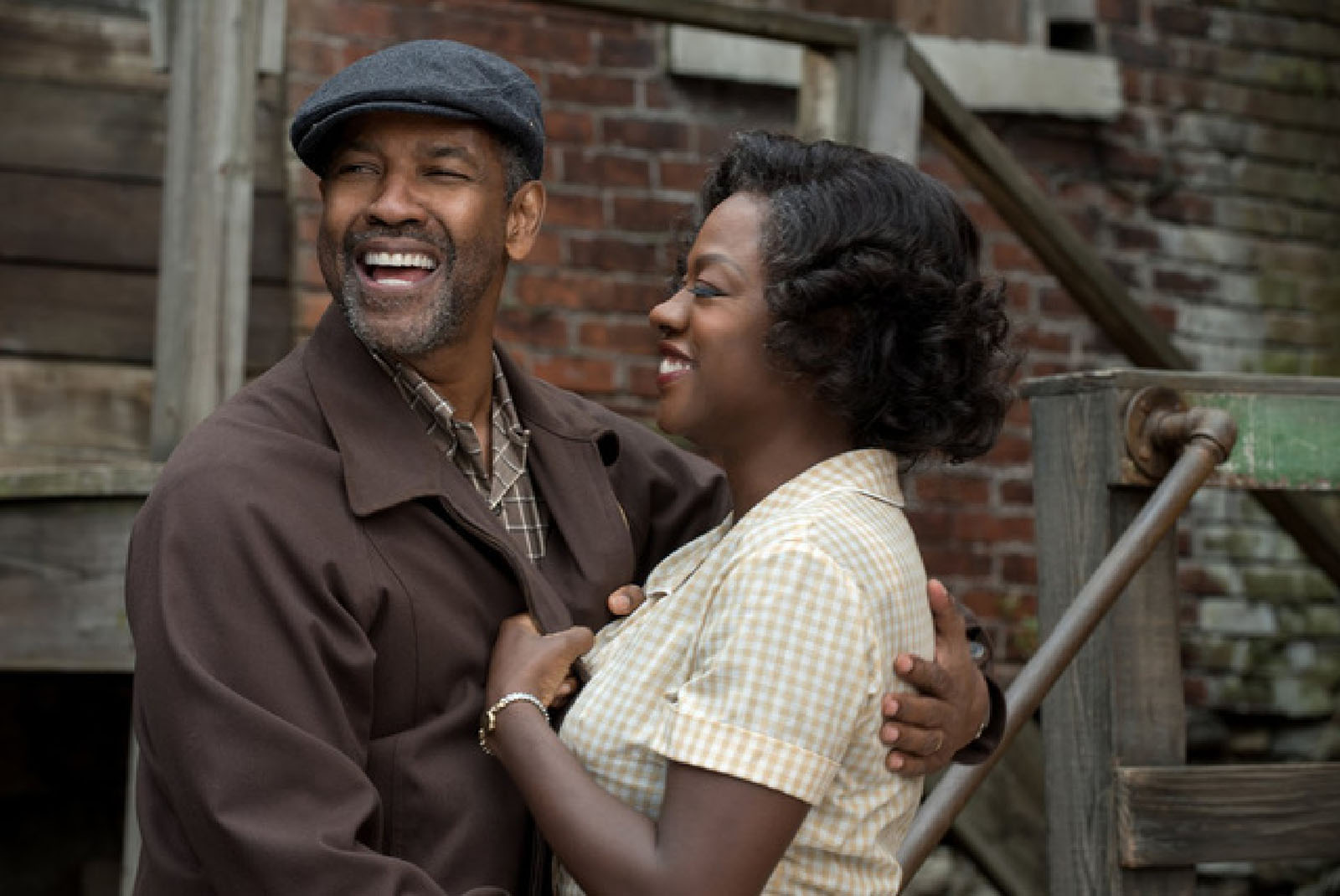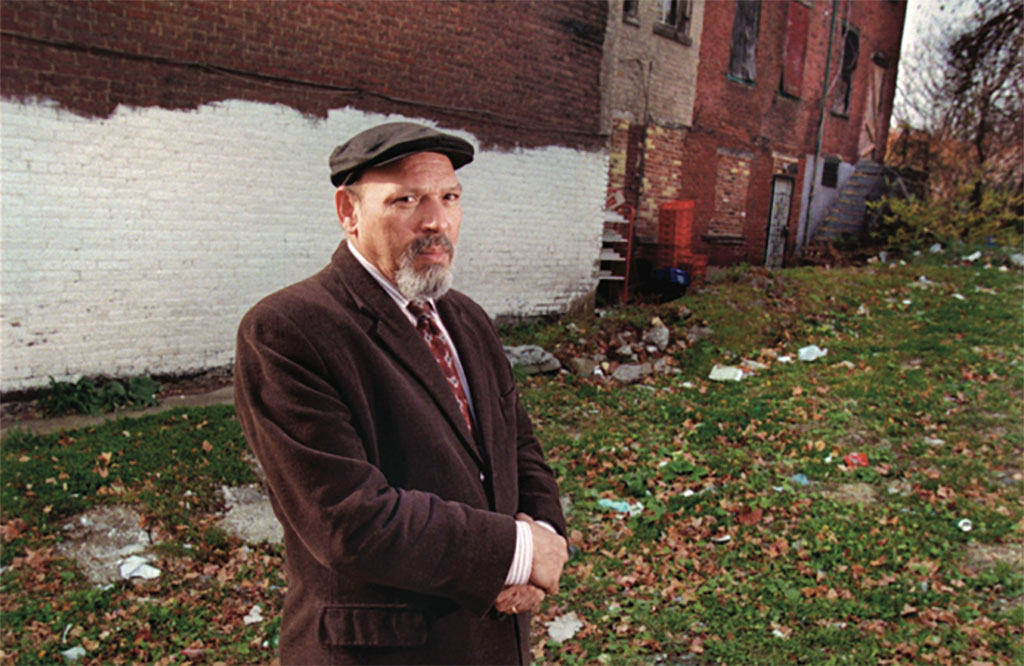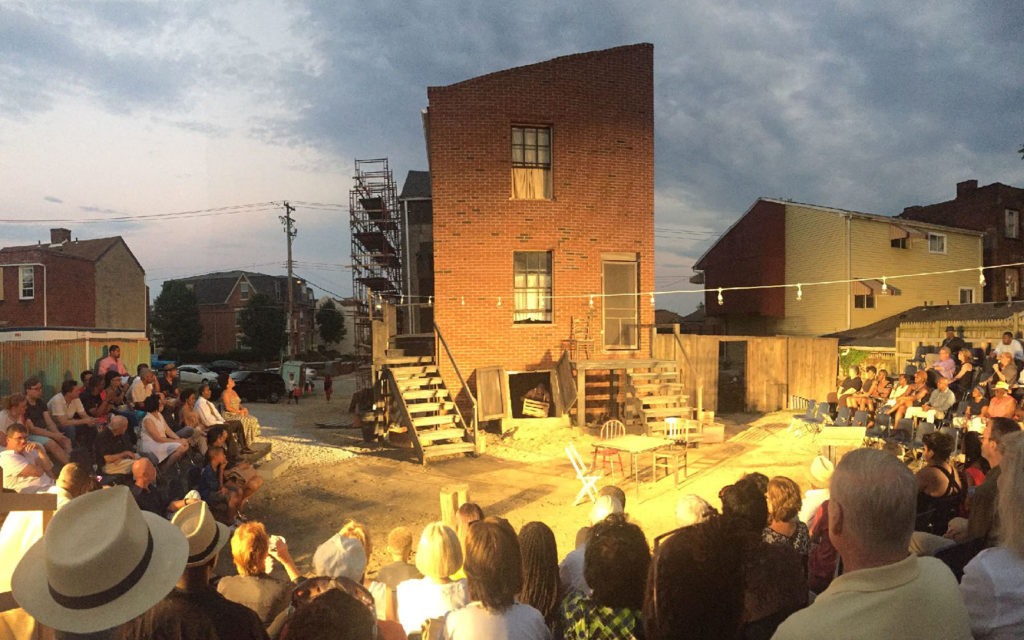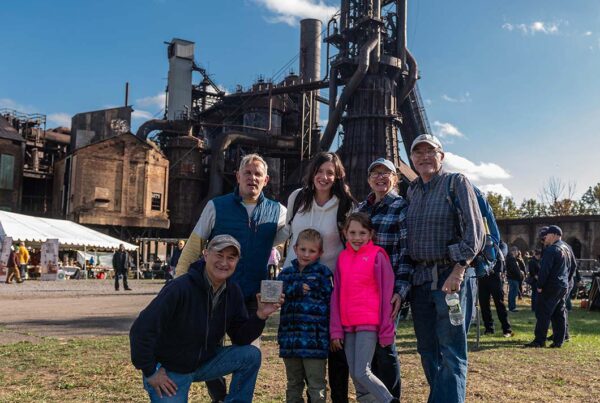
Denzel Washington and Viola Davis in Fences (Paramount Pictures)
A Look at August Wilson’s American Century Cycle

By Brianna Horan
The Carrie Carpool Cinema season kicks off this weekend with a duet of movies that were filmed in Pittsburgh: Fences on Friday night and The Dark Knight Rises on Saturday night. Both features have backdrops that will be recognizable to locals, but the setting is especially vital to the essence of Fences, a 2016 film adapted from the sixth play in August Wilson’s American Century Cycle and set in the Hill District, where the playwright was born and raised.
A collection of ten plays, each taking place in a different decade of the 20th century, the American Century Cycle depicts the struggles and triumphs of everyday life while demonstrating the impacts that slavery, Jim Crow, the Great Migration, and institutional racism have on everyday people. As in real life, the pull of the past and the hopes for the future are intertwined with the here and now in Wilson’s plays. Written and staged between 1982 and 2005, all but one of the plays in the American Century Cycle are set in the Hill District.

August Wilson at the side of 1727 Bedford Avenue in 1999. His two-room childhood home is up the stairs at the rear right. Courtesy of the August Wilson House / augustwilsonhouse.org.
“The lessons, stories, laughs, cries, anguish, hope, fervor, pain, resilience, and love reflected in my Uncle’s body of work are as relevant today as they are poignant when they were written. They stem from the Black experience, but with universal appeal and relatability,” says Paul A. Ellis, Jr., Esq., nephew of August Wilson, and Founder of the August Wilson House, a local, and national historic landmark located in the Hill District of Pittsburgh. “Fighting for equity, an aversion to blight, equal citizenship, basic community resources and amenities, safety, empathy, effective representation, and fair dealing are all concepts not dependent on demographics, just humanity and equitable application. The Historic Hill District has a stunning history of beauty and targeted destruction—the proper outcome of its residents’ ongoing struggles is a complete restoration of economic and cultural vitality.”
Indeed, the forces at play in one of the central struggles of Fences, set in 1957, remain a contentious issue today. In the Pulitzer Prize-winning play and “Best Picture” Oscar-nominated film, 53-year-old Troy Maxson grapples with his frustration and disappointment about the limited prospects that were available to him as a talented baseball player because of the major leagues’ refusal accept Black players. He provides for his family as a sanitation worker, and fights for Black workers to be allowed to drive the garbage trucks as well as load them. Maxson’s resulting bitterness creates complicated relationships with his family and the way they live their lives. Last year’s announcement from Major League Baseball that the Negro Leagues’ statistics will be incorporated into major league records has highlighted the many ways that the experiences of Black and white players were very separate and very unequal, and continue to have harmful repercussions today.
Written and staged between 1982 and 2005, Wilson’s epic ten-play collection is considered to be one of the premiere achievements of American theater. His masterpieces earned two Pulitzer Prizes, multiple Tony Award nominations (and a win for Fences), a Peabody, and many other accolades. They also brought the Hill District—and unrepresented voices—to stages on Broadway and across the globe. The Pittsburgh Courier, the Crawford Grill, Satchel Paige, Wylie Avenue, Diamond’s Five and Ten, and other local landmarks all contribute to the lively character of the Hill District in the plays—as they did on Herron Hill before Pittsburgh’s urban renewal campaign in the late 1950s and 1960s condemned and demolished the homes of 8,000 people and 400 businesses in the heart of a nationally-renowned center of Black culture and entrepreneurship. When the Civic Arena and its surrounding parking lots were built on the cleared land of the Lower Hill in 1961, the remaining residents were physically cut off from downtown, leading to further isolation and lack of resources for the neighborhood.
Born in 1945, Wilson spent the first 13 years of his life in a two-room flat (later four rooms) with his mother and five siblings at 1727 Bedford Avenue, a red-brick multi-family, multi-use building. The Hill District of his youth was multi-ethnic (mostly Jewish, Italian, and Black), and he would later remember his childhood as “wonderful… As a family, we did things together. … We all sat down and had dinner at a certain time. … We didn’t have a TV, so we listened to the radio.” The family and neighborhood life that was happening around him all inspired his plays in a very personal way that millions of audience members would later be moved by. “I happen to think that the content of my mother’s life—her myths, her superstitions, her prayers, the contents of her pantry, the smell of her kitchen, the song that escaped from her sometimes parched lips, her thoughtful repose and pregnant laughter—are all worthy of art.”
Along with art, Daisy Wilson opened her son’s mind to knowledge by teaching him to read at age four. Wilson was a bright and creative student, but after a series of demoralizing school experiences—he faced daily racist taunts at Central Catholic, felt unchallenged at Connelly Trade School, and then was accused of plagiarizing a paper as a 15-year-old at Gladstone High in Hazelwood—he dropped out in tenth grade and educated himself by reading voraciously at the Carnegie Library of Oakland. Wilson often called himself a “graduate of the Carnegie Library,” and years later the Carnegie presented him with an honorary diploma. Wilson co-founded the Black Horizon Theater in his early twenties in 1968 a few streets over from his birthplace. The characters he wrote would be infused with the stories and voices of the people in the restaurants, barbershops, and streets around him in The Hill, preserving the neighborhood on paper while so many of its physical structures were being destroyed and its people and culture were being displaced.
Wilson’s childhood home on Bedford Avenue still stands today, just a few blocks behind where the demolition of the Lower Hill was centered. He visited the building for the last time in 1999, six years before his death in 2005. By then it was already derelict, and admirers of his work who came to visit this foundational place found a wreck rather than a site worthy of the playwright’s legacy. Wilson’s nephew, Paul A. Ellis, Jr., Esq., is leading an initiative to create just such a place as the Executive Director of the Daisy Wilson Artist Community, Inc., named for Wilson’s mother. The August Wilson House (AWH), which is listed on the National Register of Historic Places, is in the process of being restored by the nonprofit to its 1950s period of significance in Wilson’s life, but in keeping with his wishes it will be “useful” rather than a museum. In addition to celebrating the literary and personal legacy of August Wilson, the mission of the August Wilson House is to serve as an arts center to nurture the historic Hill District community and arts practitioners and scholars influenced by his work.

An early fruit of the AWH restoration was this 2016 back- yard production of “Seven Guitars,” staged in the exact space August describes in the script, drawing on memories of his family life. Courtesy of the August Wilson House / augustwilsonhouse.org.
While the renovation work is in progress, the AWH has already begun hosting an annual August Wilson Birthday Block Party, which will take place virtually and in-person with Covid precautions this year on April 27. This year the artwork of ten local artists honoring the playwright’s legacy and influence will be unveiled, each one receiving a $1,000 grant. The annual Duquesne University / August Wilson House Fellowships are also underway—the inaugural Fellow Natasha Trethewey, who is a former U.S. Poet Laureate, a Pulitzer-Prize winner for poetry, and author of memoir Memorial Drive, attended the groundblessing ceremony for the AWH in 2018 and read one of her poems. The Fellowships are intended to allow nationwide artists of color to be artists in residence and “engage in literary, cultural, and artistic expression that advances their own work and serves the joint interests of the university and community.” The 2019 Fellow was Njaimeh Njie, a Pittsburgh-based photographer, filmmaker, and multimedia producer who created the public art project, “Homecoming: Hill District, USA.”
In addition to support from local and national foundations and donors, restoration of the August Wilson House is also supported by director and actor Denzel Washington, who is leading the efforts to bring all of the American Century Cycle to film. He assembled a $5 million donation in 2018 with contributions from Oprah Winfrey, Tyler Perry, Shonda Rhimes, Spike Lee, Samuel L. Jackson, Antoine Fuqua, and himself. Washington directed Fences and starred as Troy Maxson alongside Viola Davis as wife Rose Maxson (reprisals of the Tony Award-winning roles they played in the 2010 Broadway revival of the play). Ma Rainey’s Black Bottom, which is set in Chicago but was filmed in Pittsburgh, debuted on Netflix in October 2020. The other eight plays of the Cycle will also be adapted.
Rivers of Steel is pleased that Ellis will attend Friday’s screening of Fences, and will deliver remarks that include an update about the August Wilson House restoration, and his experience with Washington during the filming of Fences.
This article was published to coincide with the screening of Fences at the Carrie Blast Furnaces. For more about the Carrie Carpool Cinema drive-in film series, click here.







